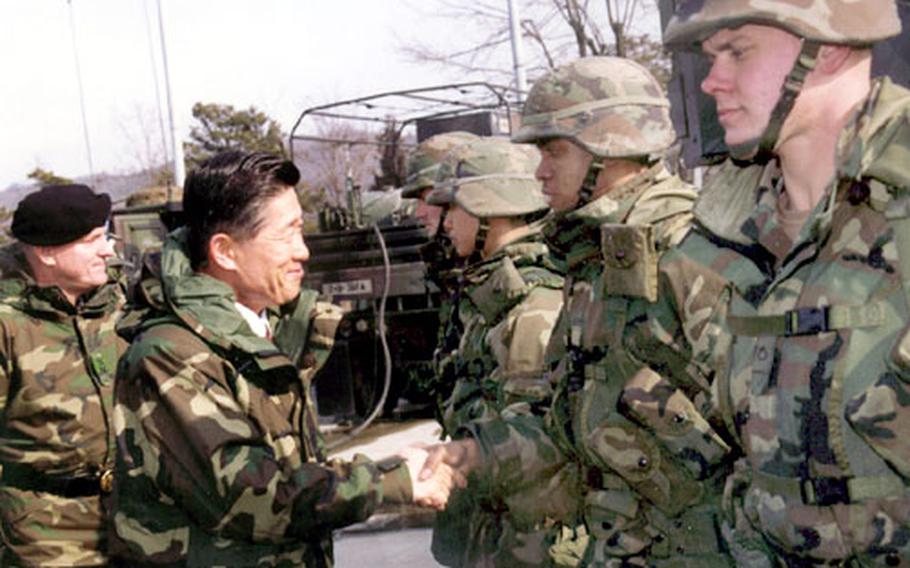
South Korean Defense Minister Lee Jun meets with U.S. troops Tuesday at Camp Stanley. Lee told U.S. soldiers to be tolerant of the changing sentiments of South Korean people. (Courtesy of the 2nd Infantry Division)
CAMP STANLEY, South Korea — South Korean Defense Minister Lee Jun told U.S. soldiers Tuesday to be tolerant of South Koreans seeking a new relationship with the United States.
“You must … respect the emotions and sentiments of the Korean people,” Lee said.
Lee spoke to about 240 soldiers in the Camp Stanley movie theater at Uijongbu, about 40 miles north of Seoul. The camp is home to aviation and artillery soldiers.
Lee called the deaths of two South Korean teenage girls last summer in an armored vehicle accident “tragic” but dismissed as “peaceful” most of the past year’s anti-U.S. military protests — many of which were sparked by the June 13 incident. He said they did not mean most South Koreans want U.S. forces to leave the peninsula.
South Korean protesters are demanding an improved relationship with the United States, Lee said, including revisions to the status of forces agreement. The pact — a continuing sore point with many South Koreans — dictates how U.S. forces are treated under South Korean law and covers military operating rules.
The protests “made it seem that the majority people harbor anti-U.S. feelings,” Lee added, saying he regretted that recurring anti-U.S. demonstrations prompted many U.S. commanders to curtail soldiers’ off-base activities last year.
U.S. Forces Korea imposed a curfew on soldiers after the acquittals of the two soldiers accused of negligence in the girls’ deaths, and after December’s South Korean presidential election.
But Lee asserted USFK has kept peace on the peninsula for the past 50 years.
The U.S.-South Korean relationship was “forged in blood,” Lee said, noting that the 2nd Infantry Division was the first U.S. unit to arrive after the Korean War began.
“The Korean people are well aware of these contributions,” the defense chief said.
After arriving by helicopter, Lee was briefed on U.S. military equipment, including the Multiple Launch Rocket System, an artillery radar system, a Paladin artillery piece and an Apache attack helicopter. He called the Apache “formidable,” saying it frightens North Korean tank units.
Lee said he knows South Korea’s deteriorating infrastructure makes it an unpopular assignment for soldiers. But South Korea is committed to improving those conditions, he said.
Under a burden-sharing agreement, the South Korean government jointly finances millions of dollars in construction projects on U.S. bases throughout the country. Lee said there’s been a “crystallization” in plans to relocate Yongsan Garrison but did not comment further.
South Koreans long have demanded the 800-acre sprawling base located in the middle of Seoul move elsewhere. Plans in the early 1990s were quashed after studies showed relocation would cost billions. Under the SOFA, South Korea would have to foot the bill of any base relocation it sought.
During a question-and-answer period, one U.S. soldier asked what message the minister would tell the soldier’s mother and father. Lee, a former military officer, said he had two sons — one assigned to a U.S. Army unit — and would do everything in his power “to ensure your son’s and daughter’s safety.”
The answer was impressive, said Sgt. Marvin Johnson, a soldier with the 602nd Aviation Support Battalion. “That means he’s a soldier’s leader,” Johnson said.
Mentioning the armored vehicle accident showed the minister was comfortable discussing a bad incident, said Spc. Julia Reese, also of the 602nd ASB.
“He put me at ease,” she said.